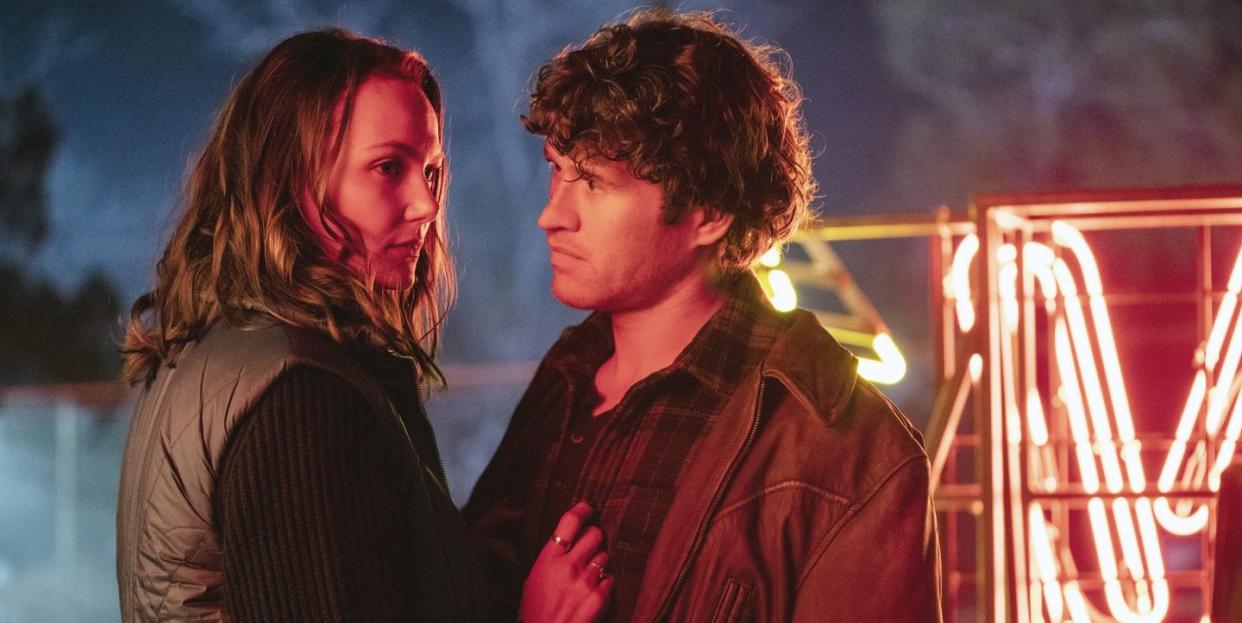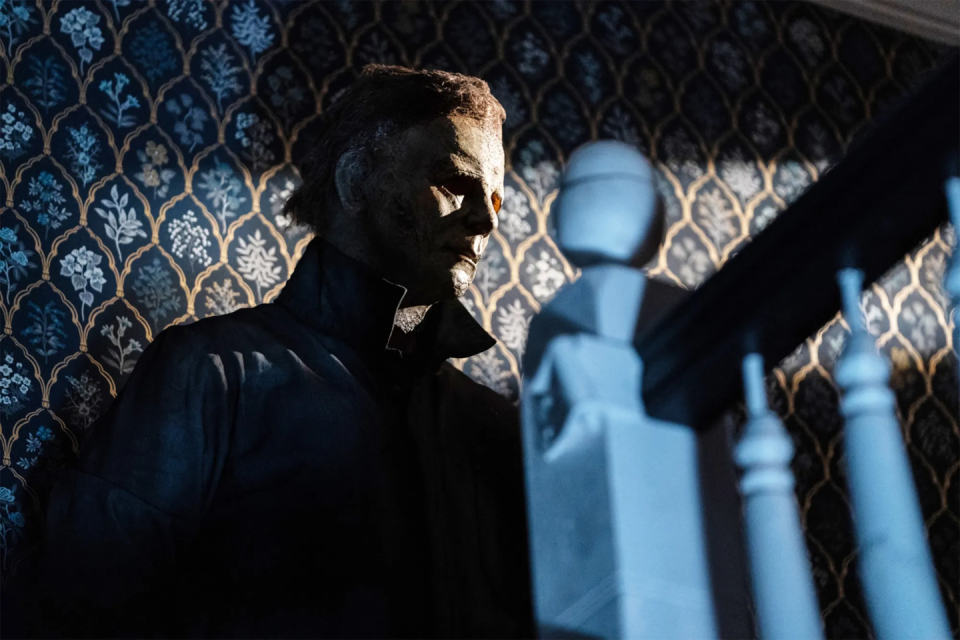Why Women Find Serial Killers Sexy AF

- Oops!Something went wrong.Please try again later.
- Oops!Something went wrong.Please try again later.
My fascination with Michael Myers of the Halloween franchise always teetered between fear, fascination, and even a vague attraction. A near-seven-foot man in a ghostly white mask who bulldozes anyone trying to get in the way of his obsession with Laurie Strode, played by then-ingenue Jamie Lee Curtis? So dreamy.
It’s no secret that other viewers found something sexy about the masked man. Michael Myers x Reader fan fiction has over 520,000 search results on Google, many splintering off into stories where Myers is obsessed with you, the reader, rather than Laurie Strode. In others, the killer is your soulmate. There are even stories where the killer engages in non-consensual sex with the reader. You would think these kinds of fantasies would remain relegated to fringe parts of the Internet like Archive of Our Own or Wattpad, until the franchise played into it.
In Halloween Ends, the franchise introduces audiences to the openly attractive character/Michael Myers proxy Corey Cunningham. Played by Hardy Boys reboot star Rohan Campbell, Corey Cunningham has all the makings of a misunderstood bad boy character. He is a young, attractive, upwardly mobile man who made a terrible mistake, only to descend into love-driven homicidal mania when he becomes sick of mistreatment for said mistake. But here’s the kicker: The granddaughter of Laurie Strode, Allyson Nelson (played by Andi Matichak), becomes his lover, hitching onto him on the back of his souped-up motorcycle like a moth to a flame.
Their love story was the perfect Twilight “Hold on tight, spider monkey” fantasy: The beautiful yet plain girl and her bad boy who would only harm those that hurt her, but never her. And boy, did I—and thousands of others—love it. The Corey Cunningham tag on Tumblr is just swimming in angsty teenager levels of horniness.
Did director David Gordon Green and the Halloween team intend to create the almost perfect Ted Bundy meets Jason Dean a la Heathers meets Arnie Cunningham a la Christine serial killer boyfriend? Quite possibly. But what does Corey’s creation and popularity say about the women and others who love him? I asked experts about why women love romanticizing serial killers—fictional or real—and if there’s anything remotely scary about it.
A psychological link between fear and sex may explain this fatal attraction.
“Fear and arousal neurologically can feel very similar,” says Dr. Gail Saltz, MD, clinical associate professor of psychiatry at the New York Presbyterian Hospital and host of How Can I Help You? Podcast. “We all have a certain fantasy around sadism and masochism, but with women more than men tends to be around masochism.” In fact, 62 percent of women have fantasies that involved non-consensual sex, according to a 2009 study of 355 women published in The Journal of Sex Research. A more recent study by BedBible concluded that roughly 65 percent of women have fantasies of being dominated sexually.
Given the success of Fifty Shades among women, this is no surprise. Saltz explains that this inclination toward sexual passivity among women, even in the realm of danger, could be related to cultural expectations and the need to feel desired. “Self-observation where you see yourself as desirable is part of sexual arousal for women, whether they're aware of it or not,” she says.
Whether the fictional Michael Myers stalking Laurie Strode or imagining being seduced to the point of danger by Ted Bundy vaguely turns you on, the idea of being desired even to the point of violence can be an undeniable aphrodisiac.

Women are the primary consumers of true crime content, despite being the majority of victims of crimes, according to 2019 research by Civic Science. On the flip side, women are less likely to consume fictional horror films compared to men. However, the women who do enjoy horror films report lower levels of anxiety and watch in search of a ‘just ending’ rather than for the grisly content itself, linking the feelings of fear with excitement and anticipation.
Women are wired to empathize with anyone, even villains.
When seeing someone in pain, women are more likely to respond with empathy than men, found a 2019 UCLA study. Women also tend to have higher levels of oxytocin, a.k.a. the love hormone, in the brain, resulting in higher levels of empathy, compared to testosterone being more present in men.
A particular trait of many true crime docuseries, dramatizations, or even the fictional portrayal of Corey Cunningham is that they encourage the viewer to empathize with the villain. Dahmer, one of Netflix’s most popular drama series, starring Evan Peters as the titular killer Jeffrey Dahmer, has been both lauded and slammed for its portrayal of Dahmer as simply a misunderstood, mentally ill man, leading hordes of people, particularly women online, to empathize with him and/or his heinous behavior.
In Halloween Ends, there are several scenes where the viewer is meant to empathize or even identify with Corey, such as being treated like a social pariah, being bullied by high school kids, and treated condescendingly by his own mother. His descent into madness has an explanation, compared to that of Michael Myers, who was portrayed as simply the embodiment of pure evil.
Unfortunately, the reasons for this empathy tends to lean in a gendered manner. “[Women] are able to connect with the feelings of other people more than men,” says Paul G. Mattiuzi, PhD, a retired criminal forensic psychologist based in California. “When you have that empathic connection to this really fascinating person, you don't want that to be about their sickness or their rottenness. So in that sense, that can get transformed into a kind of a romanticization.”
Mattiuzi highlights that women at one point were sending love letters to mass killers like “Night Stalker” Richard Ramirez, professing their love for them and empathizing with their humanity (Ramirez even married one of them). Even Ted Bundy had “groupies” who dyed their hair to match the color of his oft-victims. Jeffrey Dahmer, who was openly gay, was also on the list of serial killers who received fan mail and gifts from women. “I used to always think every time I was involved in sending someone off to death row instead of to life in prison, ‘You know, that guy’s better off on death row because now he's gonna have a girlfriend or a couple of girlfriends,” Mattiuzi recounts.
Being in danger makes women desire control.
This love of serial killers—more broadly, people who commit crimes—has a clinical name: hybristophilia. Commonly referred to as “Bonnie and Clyde syndrome,” falling for bad boys (or gals) can come with a sense of control and excitement.
“For many of these women, interacting with criminals provides a distraction from what they find to be a boring life,” Jeffrey Ian Ross, PhD, criminologist and professor at the University of Baltimore, previously told Women’s Health.
“We call it identification with the aggressor,” says Mattiuzi. “First identified by Freud, it controls your fears of the person.” Mattiuzi relates this to Stockholm Syndrome, where the victim will allow themself to fall in love with their aggressor or otherwise another dangerous person, thus overriding their fear and giving them a sense of control, as seen in the Jaycee DuGard kidnapping. “If you can change your attitude about the person, you can align with them. It’s exactly like a defense mechanism,” he adds.
Or perhaps women simply love serial killers because society wants us to.
For Jess Taylor, PhD, a forensic psychologist and victims’ rights activist, the psychological reasons women love serial killers aren’t ingrained traits, but rather societal conditioning. “[Women] do not have ‘traits’ that make us more attracted to dangerous men,” she says. “What we should be asking is how these dangerous men become so skilled and charismatic so they can groom so many women into loving and desiring them.”
To Dr. Taylor’s point, dangerous behavior such as physical and verbal violence has been linked to the traditionally masculine traits of minimal emotional expression (hello, Michael Myers’ expressionless mask) and a need for dominance. Studies also reveal that men who possess the Dark Triad of personality—narcissism, psychopathy, and an indifference to morality—were more sexually coercive and self-reported to be more sexually satisfied than men who don’t. Women are also especially attracted to men who display acts of confidence and risk-taking, two other qualities attached to those with the Dark Triad.
Halloween Ends plays this up as we see Corey Cunningham shift from being meek and passive to being confident and brash enough to go head-to-head with Michael Myers and defend Allyson from her less than-likable cop ex-boyfriend. Driving a motorcycle at high speeds through the night and killing your girlfriend’s crappy boss is also a huge plus.
Watch Jamie Lee Curtis discuss the making of Halloween Ends:
“There is also the interesting question of why toxic and violent masculinity is so prized in our society (by men and women)—and why power is craved,” says Taylor. “It is certainly seen by many to be sexy and desirable for men to be violent and abusive [in general].”
But when can an innocent crush become a real-world danger?
Ultimately, does this attraction to dangerous men, both on- and off-screen, have any real-life implications? According to Dr. Saltz, fantasizing about finding the Clyde to your Bonnie can be relatively harmless. “It depends on the person,” she says. “It can be harmless as long as you understand that it’s fantasy and not reality, and in reality you wouldn't want to be with such a person, or put yourself in a situation where you could be exposed to such a person.”
For Mattiuzi, only when a serial killer crush turns into a real-life investment in a criminal, particularly one in prison, can things get dangerous. “If you're a naive person out in the community and you hook yourself up with a [known] sociopath, the sociopath is going to be taking advantage of you and manipulating you in various ways to get whatever he wants,” says Mattiuzi. That could be anything from sexual satisfaction to money, he adds.
That said, does media writ large have any responsibility in how they tell the stories of serial killers to prevent romanticization? According to Taylor, who has worked on several true crime documentaries to tell the stories of victims, yes. “We have seen t-shirts, mugs, and other merch that glorifies and sexualizes murders and serial rapists. This has increased significantly in the era of documentaries,” she says via email. “[These] programs [can] become about the sensationalization of the men, without any thought or compassion/empathy for the women.”
Entertainment media like docuseries and podcasts covering true crime perpetrators must consider the damage done to its victims as well, Mattiuzi adds, especially in the wake of Netflix’s Dahmer retraumatizing victims’ family members. “There’s always downside when [these programs] make crime sexy,” he says.
While Halloween Ends did an amazing job of creating a sexy serial killer to fuel the fanfics and wet dreams of horror and true crime fans alike, we must always navigate the thin line between genuine fascination and fatal attraction that could eventually lead to another or one’s own demise. Though a good podcast about a murderer can make for a riveting nighttime treat, I’ll keep the dangerous boys I love fictional. Jeffrey Dahmer said it himself about his crimes, “A person who can love, I don’t think would do these things.”
You Might Also Like

